Rob Nunn's Blog: Interesting Though Elementary, page 10
May 22, 2022
A Most Dark and Sinister Business [SPEC]
I can't argue with that assessment, but I think SPEC can be classified a bit more.
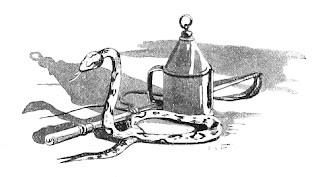
When we think of Gothic fiction and Sherlock Holmes, The Hound of the Baskervilles is probably the first thing that comes to mind. But I think SPEC got there first.
Gothic fiction (a broader term than Gothic horror) requires three big components: a monstrous or threatening villain, an old estate or castle setting, and a mood of dread and danger. And story delivers all three.
This Brute
Grimesby Roylott is one of the best villains in the Canon. And that's because he's one step away from being a Gothic monster himself. From a long line of brutes ("Violence of temper approaching to mania has been hereditary in the men of the family.") and part of a family that almost seems doomed to fail (four successive heirs were of a dissolute and wasteful disposition, and the family ruin was eventually completed by a gambler), Roylott almost qualifies as being from a cursed lineage. And by having mastery over dangerous and threatening animals such as a cheetah, baboon, and poisonous snake, Roylott keeps those in his household and surrounding scared of him.
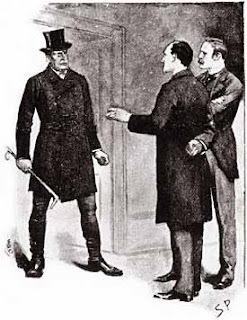
And just listen to some of the phrases that Watson uses to describe this doctor when he visits Baker Street:"a peculiar measure" of clothing"a hunting-crop swinging in his hand""his hat actually brush[ed] the cross bar of the doorway and his breadth seemed to span it from side to side""A large face, seared with a thousand wrinkles""marked with every evil passion""bile-shot eyes""thin fleshless nose""a fierce old bird of prey"
Combine those phrases with Roylott's show of power bending a steel poker with "his huge brown hands" and later his "hoarse roar" as he bellows at boy driving a trap and you have a character that isn't too far away from Frankenstein's monster. In fact, Roylott's last act upon this earth is to release a "horrible cry which ... swelled up louder and louder, a horse yell of pain and fear and anger all mingled in the one dreadful shriek. They say that away down in the village, and even in the distant parsonage, that cry raised the sleepers from their beds."
A true monster.
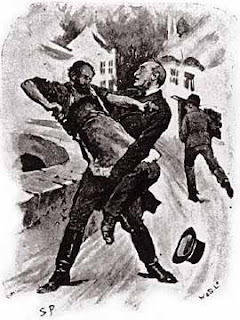
All Was Dark in the Direction of the Manor House
While many Gothic villains are equated with castles, the forlorn manor house can be just as intimidating of a setting. Helen Stoner and her late sister, Julia, are essentially prisoners in Roylott's "two-hundred-year-old house, which is itself crushed under a heavy mortgage." Helen takes pains to describe this manor to Holmes as to emphasize the character of the place where haunting whistles foretell doom. But Watson's description when he finally sees Stoke Moran for the first time really elevates this setting to Gothic proportions:
"The building was of grey, lichen-blotched stone, with a high central portion and two curving wings, like the claws of a crab, thrown out on each side. In one of these wings the windows were broken and blocked with wooden boards, while the roof was partly caved in, a picture of ruin. The central portion was in little better repair, but the right-hand block was comparatively modern, and the blinds in the windows, with the blue smoke curling up from the chimneys, showed that this was where the family resided. Some scaffolding had been erected against the end wall, and the stone-work had been broken into, but there were no signs of any workmen at the moment of our visit. Holmes walked slowly up and down the ill-trimmed lawn and examined with deep attention the outsides of the windows."
"Curving wings," "claws of a crab thrown out," broken windows, a roof partly caved in, "ill-trimmed lawn"... Is this a place you'd want to hang out? You know the kids in the neighborhood think this house is haunted!
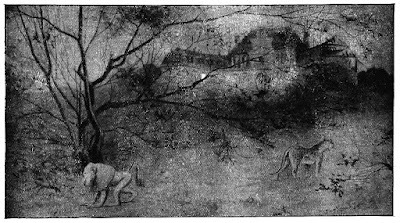
And what is it like living in such a dreary setting? "We no feeling of security unless our doors were locked," testifies Miss Stoner. And she describes the windows as being "[V]ery small ones. Too narrow for any one to pass through." Once those bedroom doors are locked, the step daughters are essentially trapped! And while Helen and Julia Stoner are locked away in their rooms, a cheetah and baboon wander the grounds freely. They never said so, but it is hard to miss the juxtaposition of freedom vs. being caged between the people and animals under Grimesby Roylott's charge.
Once Holmes and Watson have started their silent vigil inside or Stoke Moran, they are in literal darkness. As if to amp up the effect that this house has on the reader, Holmes tells Watson, "Do not go asleep; your very life may depend upon it."
If Stoke Moran isn't a house that invokes terror, I don't know what is.
It is Fear, Mr. Holmes. It is Terror.
The villain and the setting of "The Speckled Band" are enough to make this a top-tier Sherlockian adventure, but the mood that is set throughout this tale is what pushes this story from "a ripping good yarn" into the realm of Gothic fiction.
In the opening paragraph, Watson sets the scene by telling his readers that Holmes "refused to associate himself with any investigation which did not tend towards the unusual, and even the fantastic." This is hardly the typical introduction that tells us that Holmes will do something impressive or this case will be a difficult one. No. This case will be unusual and fantastic.
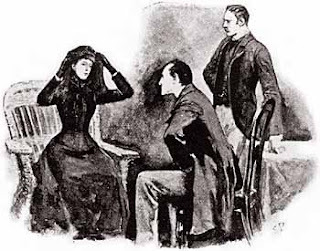
In a subtle nod to the dark mood, Helen Stoner tells her story of woe while she is dressed in black. She appeals to Holmes as if he has superhuman powers: "I have heard, Mr. Holmes, that you can see deeply into the manifold wickedness of the human heart." While she can't say specifically what terrifies her, Miss Stoner admits that her "fears are so vague." All she knows is that her stepfather is somehow involved, saying later that "He is so cunning that I never know when I am safe from him."
Describing the death of her sister, Helen states that Julia's face was "blanched with terror" and shrieked in a voice which could not be forgotten. And when did all of this take place?
"It was a wild night. The wind was howling outside, and the rain was beating and splashing against the windows. Suddenly, amidst all the hubbub of the gale, there burst forth the wild scream of a terrifies woman."
She may as well have started her story off with "It was a dark and stormy night...."
After Miss Stoner has left, Holmes himself adds to the Gothic atmosphere by invoking the Evil One by yelling out "But what, in the name of the devil!" when Grimesby Roylott arrives to threaten our heroes. Later on, Holmes will predict terror when he tells Watson that their vigil at Stoke Moran will result in "horrors enough before the night is over." As the denouement of the story comes, Watson is blinded, essentially blinding the reader as well. All we know is that Holmes's "face was deadly pale and filled with horror and loathing." Not even during the climax of this terror are we to know what is preying upon the Stoner sisters.
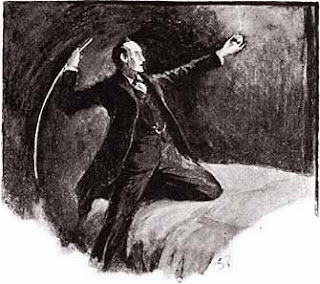
In the end, the villain is defeated and logic wins out over terror. But along the way, the heroes, victims and readers are kept in a perpetual state of fear. "The Speckled Band" can definitely be classified as Gothic fiction, as it it is "a most dark and sinister business" indeed.
May 15, 2022
Interesting Interview: Karen Wilson
Scintillation of Scions is one of the big annual Sherlockian events, and this week's Interesting Interview will be a familiar face to anyone who's ever been in person or watched it online. And you can probably even think of a few songs you've heard our interviewee sing as well. For the longest time, the name Karen Wilson was one that I associated with high quality Sherlockian output, but wasn't someone I'd ever really had a chance to talk to.
This January, Karen was invested into the BSI and I was gobsmacked to find out that she hadn't been a part of the group for years or even decades! I really got to know Karen two days later at the ASH Brunch when we shared a table. What a delightful lady! Seriously, you could not ask for a better person to spend a few hours with. And for those of you who are lucky enough to know Karen, you'll know that her laugh will instantly bring a smile to anyone's face. So get ready for the interview equivalent of a warm hug because this week's Interesting Interview is with Maryland's own Karen Wilson!
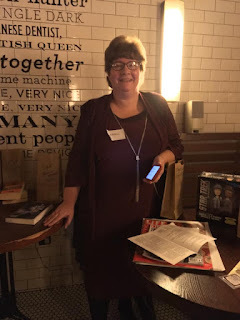
How do you define the word “Sherlockian”?
A Sherlockian is someone whose interest in the Sherlock Holmes stories (and the character) goes beyond mere enjoyment and into the realm of investing time, energy, and resources into the pursuit of “meta-enjoyment.” If friends and family are shaking their heads and rolling their eyes a little at your Holmes thing, you might be a Sherlockian.
Some collect and devour books of pastiches and/or Holmesian scholarship and/or Victoriana; some produce such material; many seek out online or in-person groups of like-minded individuals; all perk up at any apparent mention of or allusion to Holmes (however tenuous) in any context. I think you can be a Sherlockian without manifesting all of those symptoms at once, but most full-fledged (as opposed to budding) Sherlockians are guilty of at least one.
How did you become a Sherlockian?
I was 14 years old, I think, when I saw on display at the local Waldenbooks Nicholas Meyer’s The Seven Percent Solution, new out in paperback and promising a meeting between Holmes and Sigmund Freud. Never having read any Holmes, but knowing that Freud was a real historical figure, I went home and asked my parents whether Sherlock Holmes had actually existed. Would you believe they weren’t sure? I bought Mr. Meyer’s book, hoping to find out, but I hardly got two pages into the story before I realized I was going to need to read some other books first.
I ploughed though the Canon in a summer and never looked back. Newspaper articles about The Seven Percent phenomenon featured interviews with Sherlockians from all-male scions who made it seem like that part of the community would never be for me, so I became a “solitary cyclist” instead. My shelves were soon filled with pastiches and scholarship found at secondhand stores (and the odd reprint ordered from Magico). I’d stay up till the wee hours on weekends to watch Rathbone & Bruce on some fuzzy UHF channel’s late movie show. I wrote Baring-Gould-compatible fanfictions in my head. And I never lost hope that I’d make a friend who was also a true fan.
Connecting with the wider Sherlockian world didn’t happen for me until the advent of home Internet access, but by then I’d been a Sherlockian for decades.
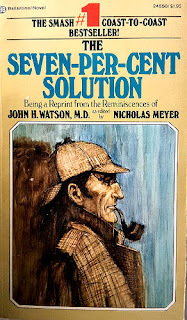
What is your profession and does that affect how you enjoy being a Sherlockian?
During the week, I’m a teacher of philosophy to undergrads; on the weekends, I’m a church organist & choir director. All that employment curtails the amount of travel I can do for the sake of the hobby, but I do what I can. Being a musician, of course, has hugely affected the way I play the Game (more below). And being a teacher has kind of made me a go-to quizmaster in several of my local scions. Since writing tests is pretty much What I Do, I’ve never minded.
What is your favorite canonical story?
I used to answer SCAN, without even having to think about it. As a musician, I couldn’t help identifying with the musician anti-heroine who thwarts Holmes’ dramatic denouement. But as I’ve aged, I’ve developed more of an affinity for poor Mary Sutherland of IDEN, unlucky both in love and (IMO) in her choice of detective! Mary is the anti-Irene, and if I write a fanfiction in my head these days, it involves some sort of justice for Sutherland.
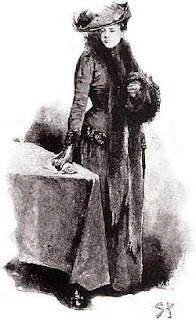
Who is a specific Sherlockian that you think others would find interesting?
How can I choose just one? Okay, here’s a delightful chap: Brent Morris is a past Gasogene of my home scion (Watson’s Tin Box of Ellicott City, MD) and the spouse of the lovely Jacquelynn Morris, BSI. A celebrity in the worlds of both Freemasonry and magic, Brent is also a PhD mathematician and a terrific scion meeting speaker. His talks on cryptography and on the academic career of the dastardly Moriarty are among the best and most entertaining I’ve heard. As a fellow (if former) mathematician, I may be biased, but only a little. Brent gets the blend of fun and scholarship just right, and we mid-Atlantic-area Sherlockians are lucky to be able to claim him.
What subset of Sherlockiana really interests you?
My special area of interest, as suggested above, is music. And I mean all of it: music in the Canon, music dating from the era of the stories, music associated with films and plays about the stories, and musical expressions of Holmesian fandom. I can’t claim expertise on every sub-topic, but last year I was privileged to be able to edit (with Alex Katz) the work of others who can. The fruit of our collective labors is the new BSI Press book, Referring to My Notes: Music and the Sherlockian Canon.
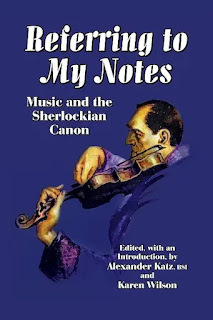
What goes into making Scintillation of Scions happen every year?
Until COVID, the answer was “an amazing committee of helpers, the generosity of folks who donate or create fantastic items for our charity bag raffle, the willingness of vendors to schlep boxes of books and other interesting Sherlockiana to sell, and the keenness of both veteran and first-time speakers to travel to Maryland (without the lure of an honorarium) to share their passion for Holmes and his world.” It also takes a certain amount of eagerness in the Sherlockian community to attend, since a non-trivial number of participants (more than 80) is required to cover expenses at a typical hotel conference facility. I would say that before 2020, I devoted 30% of my Scintillation energy to finding a slate of terrific speakers and 70% of it to worrying about attendance. The committee and vendors did the rest.
In the era of “Scintillation @ Home” via Zoom, the committee, auction, and vendors have all been put on hold. We’ve still needed the terrific speakers and the eager attendees, of course, but the other key element has been Zoom-meister Greg Ruby (with shout-outs to the also-helpful Monica Schmidt and Steve Mason). While finances are not a big concern (freewill donations have covered our expenses), I still worry about attendance: when you invite people to do the work of preparing a talk, you want to give them an audience!
This year’s Scintillation will be another (the last, I hope?) “Scintillation @ Home.” Back when commitments to a hotel would have had to be made for an in-person 2022 event, the COVID outlook was just iffy enough that I couldn’t confidently sign on the dotted line. We will be holding the event on Saturday, August 20, 2022, and if I ever get through final exams, I will be inundating the Internet with details.
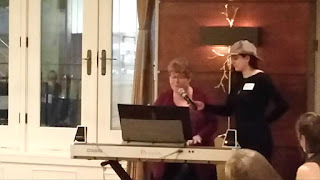
As a musical Sherlockian, how does that influence how you enjoy Sherlockiana?
I do enjoy the non-musical aspects of the hobby (reading, quizzing, nit-picking, drinking, etc.) just like anyone else, but music – parody song, for the most part – is the primary way that I contribute to the proceedings. In fact, the real question should be, “How does the fact that I am always on the look-out for songs to parody influence how I enjoy anything *else* in my life?” Often I’ll hear something that seems like Holmesian filk fodder, and I’ll have to go on a mad search for pen and paper before I lose my idea. It probably disconcerted my fellow patrons, but I was muttering possible rhymes for my Holmesian take on the Hamilton opening number on my way out of the theatre!
What book would you recommend to other Sherlockians?
I never like to miss an opportunity to show the love for a curious Holmes-adjacent novel dating from 1984 and entitled W.G. Grace’s Last Case. It’s by the late, great Willie Rushton, and what makes it curious for a book that otherwise ticks all the pastiche-y boxes is that Sherlock Holmes isn’t in it! Instead, the titular cricket legend stands in for the Great Detective. Assisted by a post-Reichenbach Watson-in-mourning, Grace encounters a host of other famous Victorians, both real and fictitious, as he attempts to solve the on-pitch murder of a bowler he was facing at Lord’s. The story spans several continents and outer space (!), and I’m laughing out loud right now just thinking about it.
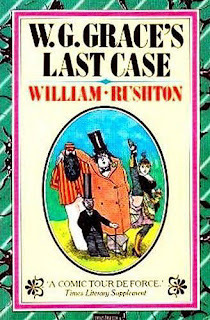
Where do you see Sherlockiana in 5 or 10 years from now?
Perhaps I’m not a great one to ask, seeing as how my youthful self failed to predict that things would eventually go co-educational! But I do think that the rise of online meetings in the wake of the pandemic is a trend that will continue. As grateful as I have been for Zoom these last few years, I personally will always prefer in-person meetings, but I concede that they are less “democratic.” Younger Sherlockians who are (1) more comfortable with tech and things virtual and (2) less able to scare up the $40 -100 that some dinner meetings can cost (not to mention travel expenses) will surely want to keep the Zooming alive.
May 9, 2022
So I Went to Chicago [VALL]
Saturday was DePaul University's annual Pop Culture Conference, and this year's theme was A Celebration of Sherlock Holmes. It was unlike most other Sherlockian conferences I've been to as the majority of the speakers here were academics that focused on Sherlock Holmes, instead of Sherlockians that took an academic approach to our hobby. It may seem like a small distinction, but it was enough of a change to make this conference feel like something different.
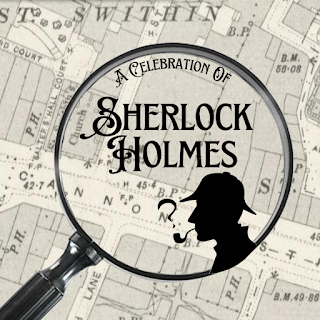
During most hours there were up to four talks or panels you could choose from, so you had to resolve yourself to the fact that you'd be missing out on some good stuff. I missed out on some great talks by Chicago lawyer Stephen Lee, set designer Arwel Wyn Jones, travelling Sherlockian Monica Schmidt, SherlockComics.com creator Johanna Draper Carlson, and many more. That being said, here are a few highlights from my day:
First of all, it was nice to spend time with some old friend the evening before and throughout the day, but one big plus for this conference were all of the faces that were new to me. Plenty of academics from around the country and locals interested in the talks were on hand to bring fresh insight to discussions. I was happy to connect with some people I'd only met online and get to know new folks. The talks are nice, but I'm at conferences to spend time with other Sherlockians.
The talks were separated into two styles: keynotes and panels. The panels had three speakers and each had a 10 to 15 minute presentation followed by Q&A time. My first panel grouped three guys together around the theme of the friendship between Holmes and Watson. Music professor Josh Harvey talked about how adaptations use musical scores to reinforce character qualities in their presentations. Josh had discoursed on this topic with Moriarty over on the Parallel Case of St. Louis blog last year, so you can get a taste of how his mind works. I am always amazed anytime Josh gets talking because that guy really knows his stuff! He was followed by Walter Podrazik who examined the friendship model in House, and David MacGregor took us on a whirlwind history of Holmes in media adaptations and highlighted his favorites.
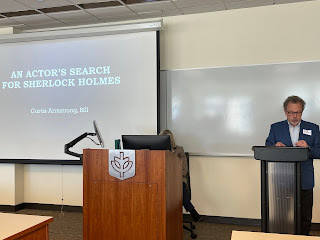
My next event was Curtis Armstrong taking us through his history as a Sherlockian and an actor and how those two paths sort of crossed, but never fully. It started out with a great story of his youthful production of Baker Street Theater that he hosted each week on a local high school radio station. Curtis talked about his brushes with Sherlockiana professionally from appearing in an episode of House to a small comment in an episode of Supernatural. But he announced that his two paths had finally merged with an Audible production that would come out this summer where Curtis gets to portray Inspector Gregson in episodes of Moriarty starring Dominic Monaghan as the famous professor. And Curtis said that the writers of this show know their Canon. He promises lots of Easter eggs for us and plenty of attention to the characters in these episodes.
Ashley Polasek followed Curtis and talked about her role as managing playwright Ken Ludwig's business as he is in the process of creating a new Sherlockian play to premiere next year, Moriarty. Ashley took us through Ken's creative process on building a play from scratch instead of adapting one big story like he had in the past with Baskerville. This new play promises to use the professor, Mycroft, and Irene Adler along with Holmes, Watson, and plenty of new characters. It was very interesting to see how Ken worked through the Canon, picking things that would work in his story, as well as what he chose to mold, merge, and adopt in this process. Ashley didn't give away any spoilers, but you could tell from the pictures of the marked up canonical texts that this play will have plenty of Sherlockian pieces coming together for one big event.
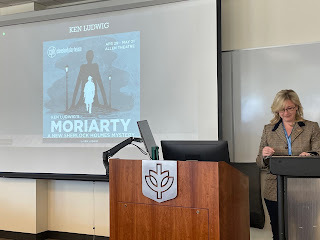
The last hour for me was another panel, this one collecting three topics about Sherlockian fandom. Allison Broesder talked about her work in creating foundational information for people entering the Sherlockian fandom and meme culture expert David Kocik talked about the history of the "Creepy Watson" meme from the Sherlock Holmes video game. But, hands down, my favorite talk of the whole day came from Lucy Miree. Her piece was entitled "There is No Master's Degree in Sherlockology: Flattening the Holmes Fan Hierarchy and Recontextualizing Love of the Great Detective." As much as she could in her ten minutes, Lucy talked about how there is very little difference between fan and scholar or pastiche and fan fiction. She cited The Adventuresses of Sherlock Holmes, prolific fan fiction writers, The Baker Street Journal, and a ton more. I could have listened to her talk for a full hour on this topic and hope to see more from this Sherlockian soon.
After that, it was time to drive back south to get home. It's always tough leaving conferences and the people you've been spending time with and being immersed in Sherlockiana. But this one was a little more bittersweet knowing that next year's conference will be on to a completely different topic. I'm very glad I made the weekend trip and look forward to seeing more from these speakers in the years to come.
April 17, 2022
The Celebrated Author [VALL]
I find Sherlockian history interesting, but the actual people who have participated in this hobby are even more fascinating and entertaining in my opinion. And for my money, the writings by Christopher Morley and Vincent Starrett are always worth checking out. I'm branching out from these two authors' Sherlockian writings to their larger bibliographies, but Morley just loves Holmes too much to stay away for long.
Christopher Morley is known among Sherlockians as the founder of the Baker Street Irregulars. But to many others in the world, he was first and foremost and first-class writer. His novel, Kitty Foyle, was turned into a Hollywood movie in 1940 and starred Ginger Rogers.
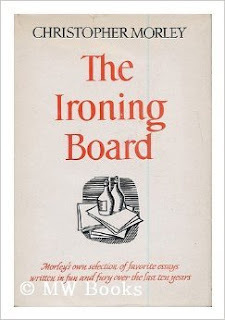
But for me, Morley's strength comes in his essays and short stories. I've read a few collections and recently finished The Ironing Board. I knew that this collection included "On Belonging to Clubs" in which Morley famously laments his small creation called the Baker Street Irregulars had grown into a movement with scions spread across the country. This is only one paragraph in an eleven page piece and while as a Sherlockian, I call it a famous line, to most folks I guess it wouldn't be much more than a passing comment in a larger story of Morley's views on clubbing up back in the day.
But as I breezed through this delightful collection, I came across so many more Sherlockian moments that show just how deep Holmes was ingrained in Morley's lifeblood. The short story "Time of Life" is a fun creeper that name checks The Hound of the Baskervilles and in which a character states that it is his job to notice what others don't. (Wonder where that line came from?)
A few pieces on and you come across "An American Gentleman" where Morley lays out the argument that Robert Louis Stevenson was a major influence on Arthur Conan Doyle's writing style.
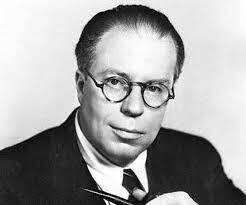
After that is the essay "A Christmas Story Without Slush." In my naivete, I had always thought that Morley's comment about "The Blue Carbuncle" was just that - a comment. But no! There is a whole essay on the excellence that is BLUE. A treat to read at any time of year, Doyle's story or Morley's essay about it.
Another fun turn in The Ironing Board is a few short stories starring Dove Dulcet, former literary agent and amateur detective. This character now works for military intelligence and is helped out immensely by a certain London detective's sister.
"Watson a la Mode" is another essay that delves straight into the Canon. In this one, Morley makes a case that Watson got out of the medical trade and made his money by going into dressmaking. Some of today's Sherlockian essays can be pretty tongue-in-cheek, and you'll find the roots of that tradition in this 1946 piece.
So if you are someone who enjoys essays or literary ramblings, let me encourage you to track down the wider writings of Christopher Morley. And don't worry, you may find yourself immersed in stories about a church that exists under a bypass or tributes to folks Morley finds important, but don't worry dear Sherlockian. When it comes to Christopher Morley, sooner or later all roads seem to lead back to Baker Street.
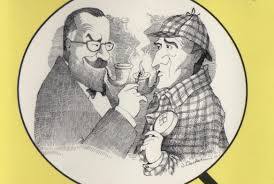
April 11, 2022
Interesting Interview: Jim Hawkins
A few years ago, I got an email from Jim Hawkins asking for information about our Holmes in the Heartland conference. It was a new name to me but ever since then you could say that I hear of Jim everywhere. Jim is active all over the Sherlockian Facebook groups and Twitter and he is always welcoming of anyone interested in this hobby of ours.
And Jim's gregarious nature comes through in spades with his biggest Sherlockian project to date, The Friends of John Bennett Shaw website and Facebook page. Anything someone could say about Shaw would only scratch the surface of how influential he was. And Jim has taken a great tack at such a large project, he brought everyone in to talk about Shaw. But now it's time for Jim Hawkins to talk about Jim Hawkins, in this week's Interesting Interview!

How do you define the word “Sherlockian"?
One who has more than a passing interest in Sherlock Holmes and the 60 stories written about him by Sir Arthur Conan Doyle. Some qualifiers:
a. A Sherlockian has read the entire canon. I know that sounds harsh and leaves some folks out, but I believe it to be true.
b. A Sherlockian has gone beyond the stories and has read some of the annotated publications, seeking to fully understand the locale Holmes worked in, and the social settings he and Watson had to live in. Historical settings are key to understanding many of the stories.
c. A Sherlockian has joined a local scion society and made friends with other like-minded people. Being a Sherlockian is not a solitary kind of endeavor. At the least you have reached out to others to share what you have learned and learn what others want to share.
How did you become a Sherlockian?
On my 40thbirthday, my wife gifted me with the Baring-Gould Annotated Sherlock Holmes. Through that I learned that highly educated people across the country were having great fun in scion societies reading, discussing, and writing about the Sherlock Holmes stories. And I discovered John Bennett Shaw. I wanted to join that bunch of people—and I became a Sherlockian.

What was your profession and does that affect how you enjoy being a Sherlockian?
I am retired from 16 years with Southwest Airlines, and 12 years of employment with LifeWay Christian Resources as a music consultant prior to that. I traveled quite a bit with both jobs, and I was able to visit other scion societies across the country. I was also able to visit lots of great bookstores, where I immediately went to the Conan Doyle/Sherlock Holmes shelves.
What is your favorite canonical story?
It’s a double combo here. "The Final Problem" and "The Empty House." Those stories are eternally connected for me; one where Holmes disappears, and the other where he reemerges.
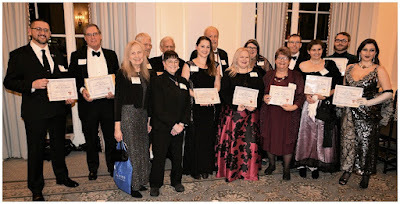
Who is a specific Sherlockian that you think others would find interesting?
That’s easy! He is the first Sherlockian I ever knew, and the one I have created a website about: John Bennett Shaw. He is one of the most fascinating men I’ve ever known, Sherlockian or not. But I’m glad he chose Holmes to center his life around. What he did with all that is simply amazing. He changed the very nature of being Sherlockian.
What subset of Sherlockiana really interests you?
I am a historian at heart, so I like to immerse myself in the historical setting of Holmes’ and Watson’s world—the Edwardian, and the Victorian eras. Conan Doyle was a genius at capturing the setting for his tales, and I admire today’s writers who can do that same thing, like Lyndsay Faye.
A recent article I wrote for the book, Referring to My Notes, was about Holmes’ Stradivarius violin. I thoroughly enjoyed getting into the world of luthiers from the 17th and 18th centuries, discovering the intricacies of fashioning an incredible string instrument that defies the years and sounds like it did 300 years ago when it was first made.
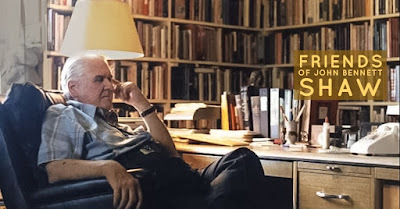
As curator of the Friends of John Bennett Shaw website, what should people know about such an influential Sherlockian?
Today’s Sherlockian should know how much we owe John Shaw for who we are as a collection of literary people--Sherlockians and Holmesians--and what we do in our scion societies today. He was universally loved and admired in the U.S. and wherever the Sherlock Holmes stories were read and discussed. He brought people together and made sure people new to our ranks found a place to thrive and grow. And he was gender-inclusive long before it became popular.
I must share how important it was to have encouragement from so many friends when I decided it was time to return to my roots in the Holmes world. I met so many new friends who knew John Shaw well when he was the BSI “Simpson”, the Sage of Santa Fe, and Big Brother in his Brothers Three of Moriarty scion society.
On the website there are testimonials about Shaw that point out his kindness and encouragement to everyone who wanted to belong. Mainstream Sherlockians like Peter Blau, Ray Betzner, Steven Doyle, Tim Johnson, Evelyn Herzog, and Susan Rice (I could go on and on) speak to how important meeting Shaw was for their own journey in following Holmes.
One quote stands out for me that gets to the heart of who John Shaw was, the one by Philip Schreffler: It is unlikely that any man since Arthur Conan Doyle himself has brought the authentic and Canonical Sherlock Holmes to so many people and so many people to Sherlock Holmes. And no man, including Conan Doyle, ever did it with such love. (Baker Street Journal, December 1990, Volume 10, No. 4)
You hadn't been as active in this hobby for a while and have come back in just recent years. How has Sherlockiana changed since you first got involved in it?
Well, I was out of the mainstream for almost 16 years when I was traveling and working for Southwest Airlines. Fan groups like 221b Con and Baker Street Babescame to the forefront during the years I was inactive (on hiatus). So, the average age of someone who calls him/herself a Sherlockian has gone down dramatically. It’s wonderful to have these young people joining our ranks, no matter how they got here—via Cumberbatch, or Jonny Lee Miller and Lucy Liu, or Robert Downey, Jr. The interest film directors and television producers have brought to the world of Holmes has been amazing and encouraging.
What book would you recommend to other Sherlockians?
For new Sherlockians I always recommend The Sherlock Holmes Miscellany by Roger Johnson and Jean Upton. Published in 2012, it is 223 pages (so close that magic number of 221) of “the essentials” everyone interested in the back story of our movement should know.
So many excellent books are being published nowadays, but devoted fans of Sherlock Holmes should not overlook the journals, blogs and podcasts being written and recorded weekly. I mention just a few: The Baker Street Journal (the BSI official journal, edited by Steven Rothman), The Sherlock Holmes Review(published by Steven Doyle at Wessex Press), Studies in Starrett (the blog published by Ray Betzner that focuses on Vincent Starrett), and the podcast by Steven Doyle, The Fortnightly Dispatch. Some of the finest writing and reportage on and about our hobby/obsession is found in these publications.
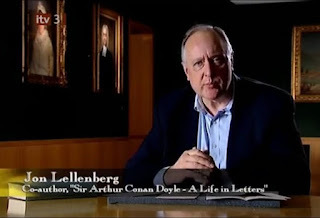
Where do you see Sherlockiana in 5 or 10 years from now?
At age 77 I don’t look down the road very far. I am confident that we will see continued growth in our fascinating hobby, particularly in publishing and movies and television. I personally plan to make the most of my BSI investiture and participate fully in BSI gatherings. Two BSI friends encouraged me to do some writing, Dr. Marino Alvarez and Jon Lellenberg. Because of their nudging I now have a few articles out there in Holmes Land. I was thrilled and amazed to be able to attend my first Writers Cocktail Party, the one you and I attended at the invitation of Steven Doyle for the Wessex Press group the day before we were invested into the BSI on 14 January 2022.
March 27, 2022
Interesting Interview: Joanne Zahorsky-Reeves
When The Parallel Case of St. Louis hosted Holmes in the Heartland back in 2018, most of the attendees were from the Midwest. But there was these two names from California... Joanne Zahorsky-Reeves and her young daughter traveled all the way from the west coast for some Sherlockian fun that weekend. Joanne was the sweetest person and was decked out in Victorian garb that caught everyone's attention. She looked so authentic that many people expected her to be a part of some demonstration at the event. But nope! Joanne was just a Sherlockian wanting to spend time with other Sherlockians.
And she is loved by the other Sherlockians that know her. When Joanne received her investiture earlier this year, the room ERUPTED in cheers! And rightfully so! Her talks and performances have received rave reviews from her fellow Californians (and they know entertainment!). So enjoy this week's Interesting Interview with Joanne Zahorsky-Reeves, a passionate Sherlockian that more people should know about!
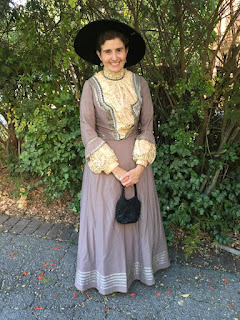
How do you define the word “Sherlockian”?
I define it as a person who has an unusual passion for Sherlock Holmes – not just an “interest;” he or she doesn’t just enjoy reading the stories or seeing the odd movie; this person will drive over a hundred miles to find that tiny, art-house theatre that’s showing an old Basil Rathbone Holmes film so they can experience it on the big screen. He or she makes widows of spouses for long weekends spent arguing over whether Watson was wounded in the shoulder or the leg – or both – or neither! He or she screams with delight at discovering some Holmes-related trinket in a dusty bookshop or a cluttered thrift store, be it a first edition or a plush mouse in a Deerstalker. We are not “normal” by society standards, and we are proud of it!
How did you become a Sherlockian?
Seventh grade, forced to choose a book in the library, when caught doing homework there during Study Hall rather than reading. Found this huge hard-back book, The Original Illustrated Sherlock Holmes. An impressive six hundred and some odd pages Two and a half pounds. I mean, what girl could say no to this this? I took it back to my chair and started reading at the first story: “A Scandal in Bohemia.” I was hooked. I tore through all the stories and novellas in just a few months.
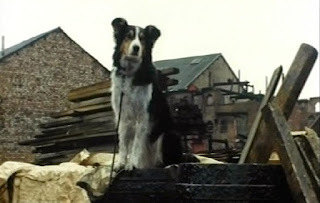
What is your profession and does that affect how you enjoy being a Sherlockian?
I am a laboratory animal veterinarian (I take care of research animals and consult with scientists on their studies), and also hold a PhD in comparative medicine. So I have a medical background, and also am trained to figure stuff out. So at 12 years old, when I first found the stories, my mind was ready for Holmes, a thinking machine, and his side-kick.
What is your favorite canonical story?
My favorite one is probably the first one I read, “A Scandal in Bohemia.” Holmes is beaten by a woman. It also gives us a glimpse into how an independent woman like Irene is able to get around in the world, by dressing up like a young man to follow Holmes into the night. With the speed that she does it, it’s obvious it is not the first time.
Being a vet, I also really like “Silver Blaze.” There’s a lot going on there behind the story that I won’t go into here, but lot’s of animal stuff that’s really very interesting
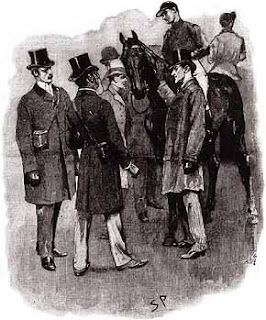
Who is a specific Sherlockian that you think others would find interesting?
Bob Thomalen (who passed away a year or two ago) was one of the first Sherlockians I met in my youth and was just such a wonderful fellow. He also did a lot of work with his World War II squadron, which made him really quite a well-rounded guy. See here: Robert Thomalen Interview: Oral History Project - The Baker Street Irregulars Trust (bsitrust.org)
What subset of Sherlockiana really interests you?
Well, the medical and animal stuff, mostly. I also collect and restore Victorian clothing, so so many of Watson’s descriptions of the clothing that the women (and the men, but mostly the ladies) were wearing at the time can really be fascinating. He really had an eye for detail! I am currently working on a paper on what Charles Augustus Milverton was wearing, and what that said about his character (literally).
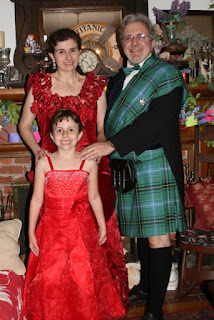
Your fashion sense at Sherlockian events is amazing. What do you look for when putting your outfits together?
You are too kind! Like I said, I collect, restore and copy Victorian women’s clothing. I never ever wear anything vintage that is in good condition. Those items I preserve. Sometimes, for local meetings of the Curious Collectors of Baker Street (CCOBS, my home Scion in Los Angeles at the moment), I will come to the meeting as a character in whatever story we are reading at the moment. Sometimes outfits are just dictated by the weather out here! Not wearing wool when it’s 103 degrees outside! Often just following Victorian etiquette – nothing off the shoulder for daytime, thank you very much….
What goes into your Sherlockian readings and dramatic performances?
Over the years I have had the chance to write and perform quite a few skits etc., back at the Baskerville Bash, then at the Gaslight Gala. Also in “real life” I have tried to bring Sherlock Holmes “to the masses” – I re-edited a script of “The Hound of the Baskervilles for our local community theatre, and during the pandemic, when the theatre switched to Zoom plays, was able to write a series of modern “gumshoe” mysteries where the two LAPD detectives consulted with a great-great-great-grand niece of Holmes. Whatever I have written, especially for the more general public, I always hope that it sparks some interest in the original stories.
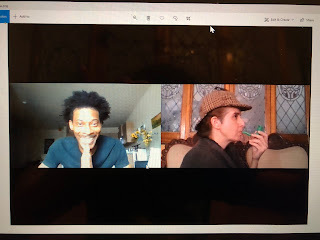
What book would you recommend to other Sherlockians?
There are several books that help to put Victorian London in perspective, that help Sherlockians understand the backdrop of when and where the stories are taking place. Judith Flanders is an expert on Victorian London and has written several very good books on this topic. The Victorian City is very interesting, although it focusses more on Dickens time, which is a little earlier than Holmes and Watson. Still it gives the reader a really good idea of what the City was like. She also wrote The Invention of Murder and The Victorian House: Domestic Life from Childbirth to Deathbed although I haven’t had a chance to read the latter yet and I have only read selections from the former. It’s all really amazing stuff, and made me think twice about wanting to go back in time to live in Victorian London!
Where do you see Sherlockiana in 5 or 10 years from now?
I see us even more on the Internet, which I think might be a double-edged sword. Personally I enjoy the meetings in-person, and the conversations had about specific stories and plot-points, etc. In my own life, I am so busy that I really don’t have time to squeeze in the time to be able to “surf” what seems to be growing internet presence of Sherlockian sites – which I think is really good for the younger generation, but it’s leaving us older folks behind. And yes, I count myself amongst the older generation now.
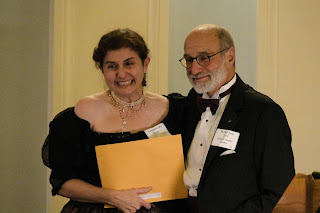
March 20, 2022
All That Was Monstrous and Inconceivably Wicked in the Universe [DEVI]
Tonight, I'm happy to announce an open call for anyone interested in Sherlockian scholarship that plants its tongue firmly in cheek.
What if the Canon were actually cover stories for fantastic tales of horror? This approach has been done many times before in pastiche, but let's take a swing at publishing this from a scholarly approach. Come join the fun!
The Monstrum Opus
of Sherlock Holmes
A Compendium of Horrors
Dr. Watson Dared Not Tell
Those who study the life of Sherlock Holmes have long known that there are things that Doctor Watson didn’t tell, details that have never quite made sense, and matters that could not be revealed to the general public. And many of the Sherlockian faithful have speculated, in oft-ignored articles in the journals of their cult, on what real mysteries might truly lie behind the carefully presented words that they call the “Canon.” A feeling of “something more” lurking behind each page has haunted many readers of John H. Watson’s reports.
But let us suppose, for a moment, that a new collection of articles was about to be gathered and presented to the public en masse to reveal what actual horrors lay behind the “stories” of Sherlock Holmes, creatures for which, like the giant rat of Sumatra, “the world is not yet prepared.” All of the monsters, hidden in plain sight behind the sixty stories of the Sherlockian Canon revealed. Werewolves, mummies, cryptids, supernatural beings . . . except maybe ghosts (“No ghosts need apply.”) and vampires. (“The idea of a vampire was to me absurd.”) . . . given their proper place by those students of the Canon who have studied the life of Holmes with a keen eye for such things.
We’re not talking about another book of pastiches or fiction here, but the sort of speculative articles that Sherlockians have always written, using their imagination or “powers of logical synthesis” to make connections and see more than the average reader. Hosting this collection, like some crypt-keeper of ancient lore, will be a descendent of Cecil Barker, Holmes’s rival in such investigations. As the one descendent of Barker to keep their sanity even while holding on to the terrific truth of such creatures’ existence, there will be no doubting each piece’s veracity by said host as they introduce each article and its writer..
One could see this collection as a veritable monstrum opus of Sherlock Holmes.
Or to put it plainly: We want articles about Sherlock Holmes and monsters!
Any monsters. All the monsters. (Except maybe those ghosts and vampires, as denied specifically by Holmes earlier. We have to respect the Master.) We’ll be making a list and checking it to make sure we don’t have any writers duplicating efforts in their choices. We’ll also have a list of potential subjects for those who like a target in their Canonical monster hunt.
This project will be edited by Rob Nunn and Brad Keefauver, and will be published through Amazon Direct Publishing. (If you are unfamiliar with this format you can view Brad’s recent book here and Rob’s here.) Authors in this collection will receive a contributor copy of the book. All proceeds from this project will be donated to The Beacon Society, helping to introduce students to the stories of Sherlock Holmes (even if those stories don’t tell the monstrous facts…).
Are you interested in following the paths that John Watson dared not write of? If so, please respond to Brad Keefauver or Rob Nunn by March 31. The projected date for submissions will be July 31. Let’s tell the world about all of the monsters that Sherlock Holmes really faced!
March 13, 2022
Interesting Interview: Christian Monggaard
I'm going to bet that many readers aren't familiar with this week's Interesting Interview. But Denmark's Christian Monggaard is definitely a Sherlockian who would be a great guy to spend some time with. A Danish journalist, author, and collector, Christian has made it a point to amass a wonderful collection of the Shaw 100 List.
I got to know Christian through his piece in The Finest Assorted Collection, and found his approach to our hobby a great one. He is all about writing for the public and enjoying Sherlockiana with others. If you are willing to let Google Translate do some work, Christian's website is a real treasure trove of writing about film, books, and Sherlockiana. You'll get a real feel for a guy who knows his craft and is passionate about his interests. But if you want to get a taste of Christian's take on Sherlock Holmes and the Sherlockian scene in Denmark, then dive on in to this week's Interesting Interview!
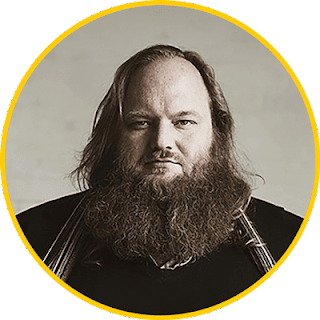
How do you define the word "Sherlockian"?
I think I have a very broad definition of the word, but I do believe you should have more than a passing interest in Sherlock Holmes, his biographer and literary agent. That interest could also be in the films and TV shows – or comic books. Usually, it all leads back to the source, the original stories and the writings on the writings. I began with the books, took a detour to the films and TV shows and now I am back with the books, keeping my eye on everything else.
How did you become a Sherlockian?
I have been reading Sherlock Holmes all my life. When I was born my mother places three things on the shelf above my crib: A Donald Duck magazine, a book with Alfred Hitchcock and the Three Investigators and a book of Sherlock Holmes stories. Those three items have more or less shaped my life. In my teens in the 80's I began rereading the books – and a lot of other classic British crime stories – watched the Jeremy Brett series and really fell in love with Sherlock Holmes.
At that time, I also became aware of The Danish Baker Street Irregulars/Sherlock Holmes Klubben i Danmark and for a short while corresponded with then president and famous Sherlockian, Henry Lauritzen. I didn’t become a member until 25 years later – and I am now on the board – though I did write quite a few articles on Sherlock Holmes in the newspaper, Dagbladet Information, at which I am the film- and TV-editor. I do believe I have always been a Sherlockian at heart, but it wasn’t until I joined the club here in Denmark, I really felt a part of the Sherlockian community and dared call myself one.
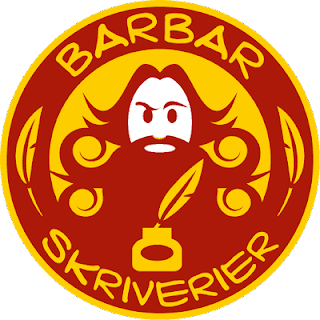
What is your profession and does that affect how you enjoy being a Sherlockian?
I recently turned 50 and have been writing professionally for almost 30 years. I am a journalist, film critic and editor at a daily Danish newspaper, Dagbladet Information, and I have been so for 25 years now. Before that I was the editor of a film magazine. And even before that I briefly studied classical archaeology at the University of Copenhagen. I have written a dozen books on cinema, TV and Danish film directors.
Because of my work and my love of the moving image I have always been very interested in the film and TV adaptations of Sherlock Holmes, and I think that I have reviewed every show and film that has to with Holmes during my years as a critic. I also had the pleasure of interviewing some of the people behind those films and shows – for example Steven Moffat and Mark Gatiss (Sherlock) and John Musker and Ron Clements (The Great Mouse Detective).
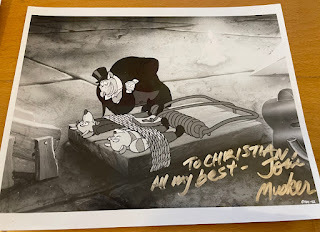
What is your favorite canonical story?
That would be The Hound of the Baskervilles. Probably not the most obvious choice, but I really like the combination of mystery and horror. It is very suspenseful and gothic and playful at the same time. And there are at least three great dramatizations: The one from 1939 with Basil Rathbone and Nigel Bruce, the Hammer Horror one from 1959 with Peter Cushing and André Morell and directed by Terence Fisher, and of course the Granada one with Jeremy Brett and Edward Hardwicke.
Who is a specific Sherlockian that you think others would find interesting?
There are a lot of Sherlockians I find interesting: Edgar Smith, Vincent Starrett, Christopher Morley, John Bennett Shaw etc. But there is one I would love to talk to for a couple of hours or days to get his full perspective on Holmes, Watson, Doyle and the Canon, and that is Stephen Fry. I am a big fan of his and I love his audiobook version of the stories. He has been a Sherlockian for many years, and he is himself a fascinating, brilliant and knowledgeable man with a great sense of humour. I think it would be very exciting to be in his company talking Sherlock Holmes.
What subset of Sherlockiana really interests you?
It must be the films, TV shows and comic books. I can combine three of the great loves of my life that way. Sherlock Holmes is a very flexible, elastic character and you can use him for many things and in many ways – you just have to do it with love and knowledge AND respect the spirit of the original stories.

What does the Danish Sherlockian world look like?
It is not very big and not that active, but it has gotten somewhat bigger and younger during the last 5-10 years, mostly because of the BBC series, Sherlock. That show got a lot of younger people, many of them women, hooked on Sherlock Holmes and that lead them to the books and the club. The members of the club itself meet up a couple of times a year, and we publish a magazine, Sherlockiana, three times a year. We have a small handful of scions that meet more regularly, talking about the books, the films, TV shows, radio adaptations and the like.
Recently one of our members, Palle Schantz Lauridsen, became a doctor in Sherlock Holmes at the University of Copenhagen, and another long-time member, Svend Ranild, who is also the editor of Sherlockiana, was invested in the Baker Street Irregulars. I must say that we sometimes look towards America, a bit envious of the Sherlockian world there. It seems to be very dynamic and full of scions meeting and publishing a lot.
What is it about the Shaw 100 that so fascinates you as a collector?
There are several things. Most importantly it has been a good guide while becoming a ’professional’ Sherlockian. It has helped me get a lot of the books I need in my collection. And when I began collecting according to the Shaw 100, I decided I would get all the books on all the different iterations of the list. So, it is more like the Shaw 150.
Also, as a collector – I collect films, LEGO sets, books, comic books and much more – I sometimes find it difficult limiting myself and the Shaw 100 gave me a goal to pursue, and some kinds of boundaries to stay within. I must admit that I haven’t kept to that list only and my Sherlockian collection is quite big now. In his essay on collecting Sherlockiana John Bennett Shaw writes about having a shelf, a collection or a library. I believe I have a library.
Also, I really like his idea of sharing: If you have one book, you brag. If you have two, you share. I have that kind of relationship with a Sherlockian friend of mine, Michael Skov Lambek, who is also a collector, and it is very fun and rewarding. Collecting Sherlockiana has also made me friends in the international Sherlockian community, and I owe Denny Dobry a big thanks for getting me many of the books I needed in my collection.
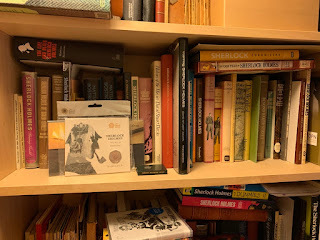
What book would you recommend to other Sherlockians?
Again, there are so many, but I must say that I cherish The New Annotated Sherlock Holmes with annotations by Leslie S. Klinger. When I read one of the stories, I also like to read what Klinger writes about it. And then of course The Private Life of Sherlock Holmes by Vincent Starrett, one of the pillars of the Sherlockian world. I have a first edition of that book, with a dust jacket and signed by Starrett.
Where do you see Sherlockiana in 5 or 10 years from now?
That’s a tough one. I really don’t know. But I do hope that it only grows bigger and even more connected. One of the positive by-products of the pandemic is that a lot of talks, meetings, lectures are now also done online which gives us in Denmark the possibility to participate much more than usual. I was supposed to be at the BSI Weekend and Dinner in January, but I couldn’t make it because of Covid concerns. That meant I also missed the opening of Glen and Cathy Miranker’s exhibition, Sherlock Holmes in 221 Objects, at the Grolier Club. But later I got to watch a talk with Nicholas Basbanes and Glen Miranker online from the club and about the exhibition, and that was a real treat.
I have always had the impression that the Sherlockian community is a generous and welcoming one, very connected across the globe. Technology has only made that part easier. After I had my first article in The Baker Street Journal last year – on Sherlock Holmes and The Three Investigators – and an essay in the book on colleting Sherlockiana, that you, Rob Nunn, edited with Peter Eckrich, I have received e-mails from other Sherlockians wanting to connect. That is a very nice feeling.
Also, the interest in Sherlock Holmes really doesn’t seem to wane. New books, pastiches and studies are being published all the time. New websites and podcasts pop up. A new Enola Holmes film is on its way – I look forward to that – and potentially exciting new TV shows and comic books are coming. I can recommend the French-language Dans la tête de Sherlock Holmes. It is a very inventive and beautiful comic book that plays with both the artform and its central character. Two volumes have been published so far. A third is thankfully on the way.
February 20, 2022
Interesting Interview: Steve Emecz
If you've read a Sherlockian pastiche in the past 15 years, chances are Steve Emecz had something to do with it. Steve's MX Publishing was my first publisher when I had an idea to turn Sherlock Holmes into a criminal mastermind back in 2017 and I remember just how nice of a guy Steve was on our calls in the led up to it. In fact, Steve is the whole reason I have this blog today! So when Steve asked me to be interviewed for the MX Audio app I was happy to help. And it dawned on me that Steve Emecz, someone who should've been one of my first interviews had never been invited! Mea culpa. Better late than never, I guess.
In preparing for my interview with Steve and his interview here, I delved back into the MX site. Holy cow, are there a ton of books there! And even though MX is known for their pastiches, there are some really great selections of scholarship, biography, and media studies as well. I've always known that MX Publishing is tied to philanthropy, but wasn't aware of just how much of their business gives to worthy causes. So I sure didn't feel bad adding a few more MX titles to my bookshelves this week. And I think after this week's interview with Steve Emecz, you may just want to add a few more of their books to your collection as well to support a good guy and the good he does in the world.

How do you define the word “Sherlockian”?
For me there are three levels. Shelockian is someone who likes Sherlock. Holmesian is someone who is more traditional (you shouldn't use the name Sherlock anyway as in his time he would have been 'Holmes') and then the really focused group the Doyleans. So for me, a Sherlockian is someone who likes Sherlock Holmes in whatever format and era.
How did you become a Sherlockian?
In 2008 we were approached by Alistair Duncan with a book called Eliminate The Impossible. It's a review of the stories and actors that had played the main characters to that point in time (before RDJ and Cumberbatch) and we began publishing Holmes non-fiction and then once the big new adaptations came out we started publishing fiction too and it's grown from there.
What is your profession and does that affect how you enjoy being a Sherlockian?
My day job is in technology so completely removed from Holmes. I've been lucky to have travelled extensively with my career in the last 30 years and publishing is the ideal own business to pursue alongside a day job as it is all done in the evenings and weekends.
What is your favorite canonical story?
It's The Hound simply because I have been involved in many adaptations of it and seen it on screen and stage. MX has lots of books on The Hound from a graphic novel and stage plays through to biographies (The Hound of The Baskervilles). In a recent interview with Scott Monty and Burt Wolder of I Hear of Sherlock Everywhere for our app, Scott talked about how Conan Doyle wrote the moor as a character and I think he's onto something there.
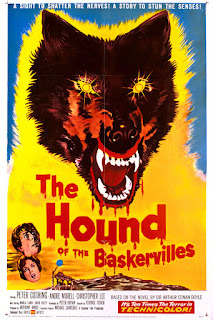
Who is a specific Sherlockian that you think others would find interesting?
There are so many to choose from - Lee Child is my favourite writer personally and he was at Granada studios at the same time as Jeremy Brett so he tops my list of non-Sherlock writers. David Marcum as the most prolific editor and writer of Holmes pastiches and finally Otto Penzler as a collector, publisher and owner of the Mysterious Bookshop.
What subset of Sherlockiana really interests you?
I like other adaptations that are based on Holmes - my favourite being House with Hugh Laurie and of course Reacher - though he doesn't have a Watson so I think House just about edges it for me in terms of Sherlockian influence.
The MX catalog is gigantic! What are one or two highlights from your time in putting out so many books?
The MX Book of New Sherlock Holmes Stories is an amazing collection which is up to thirty volumes now with more to come. Over 800 stories and 200 authors and lots of big names taking part.
I also love the novels and our partnership with Mondadori the big Italian publisher who have translated over fifty now - from those probably The Vatican Cameos is the highlight as it has won several awards and has an endorsement from Lee Child.
The Art of Sherlock Holmes has been an amazing project with 56 pieces of art created from our stories - building the Virtual Gallery was a lot of fun. Created and curated by one of our novelists Phil Growick, I was lucky enough to be at the gallery launch of book one in the USA and we're working on some more fun things for that. My personal favourite from the collection is Christina Major's piece featuring Irene Adler.
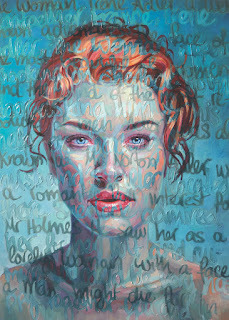
MX is also known for its philanthropic endeavors. How did they come about?
There are four main programmes we work with. The MX Book of New Sherlock Holmes Stories supports Undershaw school for children with learning disabilities. We got involved when the original building was going to be destroyed and we supported the team looking to save the building (working with Stephen Fry, Mark Gatiss and others). I then became a patron of the school and we've raised over $95k for the school now.
The second is Happy Life Mission which my wife brought me into when she took a career break to volunteer in Kenya. We've spent eight Christmases there with the kids and people can read up about this years' trip on our blog. It's a baby rescue centre that has saved the lives of over 800 abandoned babies in Nairobi.
The third is the UN WFP (World Food Programme) for whom I am an advisor and technology mentor. The team won the Nobel peace prize in 2020 which was an amazing experience to be a small part of.
The fourth is iHeart who work with teenage mental health - it started in the UK but spreading worldwide now. We have more on our About Us section on our website.
What book would you recommend to other Sherlockians?
If you're looking for short stories very similar to Sir Arthur Conan Doyle I would start with Volume 1 of the MX Book of New Sherlock Holmes Stories - with the knowledge that if you like them there are more than 800 more to come.
If you are a Jeremy Brett fan then the biography, Jeremy Brett Playing a Part which won the Sherlock Holmes Book of The Year 2021.
Where do you see Sherlockiana in 5 or 10 years from now?
Three trends I think. I'm sure the expansion of characters to the canon that weren't supported at the time will continue and expand a lot. From strong female characters (Enola Holmes) to LGBTQ+ and BAME (Black, Asian, and Minority Ethnic) characters etc.
I expect Sherlockiana will enter the Metaverse very soon and it will be interesting to see how that plays out.
We expect many more readers to switch over to audio - it's our fastest growing format. So much so that we created an app 'The MX Audio Collection' for fans which enables us to load stories, but also interviews with Sherlockians and other content.
February 6, 2022
Interesting Interview: Al Shaw
I got to know Al Shaw from various conferences. Always welcoming and sardonic, he is a great guy to hang around with (as long as you can accept the fact that your hair is never going to look as good as his). No matter the topic, you can count on Al to have some knowledge of it. As the head of the Chicago scion, Hugo's Companions, his is a name that is known all throughout the Midwest.
When Peter Eckrich and I started coming up with names of people to participate in The Finest Assorted Collection, we quickly learned about Al and his pipe collection. And what goes better with Holmes than pipes? I don't know about anyone else out there, but the thought of taking up pipe smoking has crossed my mind a time or two as I enjoy the Canon. But for now I will live vicariously through Al. And we can all see Sherlockiana through his eyes right now with this week's interview!
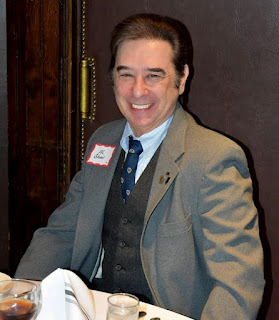
How do you define the word “Sherlockian”?
A person who enjoys reading the stories by Sir Arthur Conan Doyle (The Canon), and pursues their interest in that Victorian world according to paradigm that it describes.
How did you become a Sherlockian?
In 1971 the Chicago Tribute ran an article stating that Sherlock Holmes' Birthdays was being celebrated by Hugo's Companions and it gave a contact address. (There was no email, kids)
I wrote and received an invitation to that dinner. I was warmly greeted by the late John Neiminski, and, by the end of the evening, was invited to future meetings.
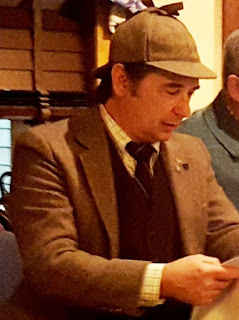
What was your profession before you retired and does that affect how you enjoy being a Sherlockian?
I was an IT manager. Thank goodness it did not affect my enjoyment whatsoever. ;-) 1895 is quite always from the world of bits, hard drives and bytes. I much prefer the bite of a gigantic hound.
What is your favorite canonical story?
"The Red-Headed League." I have had my own share of three pipe problems. Haven't we all?
Who is a specific Sherlockian that you think others would find interesting?
Dino Argyropoulos; He is the editor of the Grimpen Mire Gazette and is responsible for it rebirth. He is the Secretary of Hugo's Companion's, one of the two forces behind success as Master Of the Hounds. (The other being Monica Schmidt) Dino has probably won more Holmes quizzes than even local Holmes quizmasters, David Humphries and Phil Cunningham. He is a retired Librarian that seems to now be a library of knowledge unto himself. One might say that he is my brother from another mother.
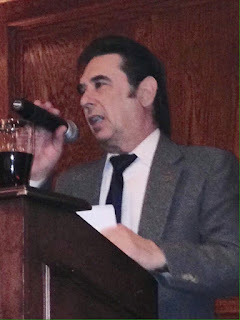
What subset of Sherlockiana really interests you?
I would say the Solar Pons books. Perhaps because Derleth was a Midwest local who really and truly understood the meaning of 'pastiche.'
How did you become a Sherlockian pipe collector?
The short answer is : When a pipe smoker is a Sherlockian, it is inevitable.
To smoke a pipe while reading the canon, it is quite nearly possible to see the yellow fog swirl past the window pane. The scent of past shag tobaccos linger in the pages.
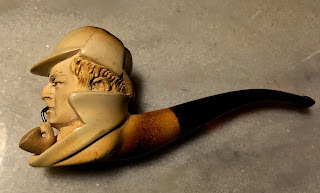
First I think there is a misconception about Chicago's Sherlockian scene. There is not one major Scion. There is here, one scion or another so that each may find there preference. There are actually so many that I can only name a few; Hugo's Companions is the oldest and was spawned to feed members to The Hounds Of The Baskerville (sic) . The Hounds BTW, is one of the few and oldest actual chapters of the BSI and not a scion. The Criterion Bar is probably the oldest Chicago stand alone scion, There also are The Sherlock Holmes and All That Jazz Society, The Watsonians, The Torists, The Bee Speckled Band and the Scotland Yarders to name the first few that pop into my head.
Many people are members of multiple groups some just of one according to that group's particular focus. I would say there is bolt for every nut.
What book would you recommend to other Sherlockians?
I would say if you have not read it, acquire a copy of Barring Gould's Annotated Sherlock Homes. It was the first real major undertaking that has spawned the others of that ilk.

Where do you see Sherlockiana in 5 or 10 years from now?
Well THAT my friend is the question, For me the issue is will people still read the Canon? So let's look at the past to perhaps perceive the future. When what we now call Old Time Radio came upon the scene, people said (I was told by those who were there, I am not THAT old) that is the end of reading. We can can now hear the stories on the radio. That together with films, Ellie Norwood, even Gillette, did give the less inclined to eschew books. But the stories lived, then came TV with Ronald Howard and even god help us, Cumberbatch. Yet books of the Canon still persist. Today there is the Internet and Zoom.
So let me close with this paraphrase;
... still the game's afoot for those with ears
Attuned to catch the distant view-halloo:
... A yellow fog swirls past the window-pane
As night descends upon this fabled street:
A lonely hansom splashes through the rain,
The ghostly gas lamps fail at twenty feet.
Here, though the world explode, these two survive,
And it is always eighteen ninety-five.



